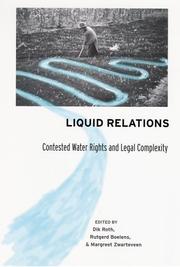| Listing 1 - 3 of 3 |
Sort by
|
Book
ISBN: 3038978116 3038978108 Year: 2019 Publisher: MDPI - Multidisciplinary Digital Publishing Institute
Abstract | Keywords | Export | Availability | Bookmark
 Loading...
Loading...Choose an application
- Reference Manager
- EndNote
- RefWorks (Direct export to RefWorks)
Water acquisition, storage, allocation and distribution are intensely contested in our society, whether, for instance, such issues pertain to a conflict between upstream and downstream farmers located on a small stream or to a large dam located on the border of two nations. Water conflicts are mostly studied as disputes around access to water resources or the formulation of water laws and governance rules. However, explicitly or not, water conflicts nearly always also involve disputes among different philosophical views. The contributions to this edited volume have looked at the politics of contested knowledge as manifested in the conceptualisation, design, development, implementation and governance of large dams and mega-hydraulic infrastructure projects in various parts of the world. The special issue has explored the following core questions: Which philosophies and claims on mega-hydraulic projects are encountered, and how are they shaped, validated, negotiated and contested in concrete contexts? Whose knowledge counts and whose knowledge is downplayed in water development conflict situations, and how have different epistemic communities and cultural-political identities shaped practices of design, planning and construction of dams and mega-hydraulic projects? The contributions have also scrutinised how these epistemic communities interactively shape norms, rules, beliefs and values about water problems and solutions, including notions of justice, citizenship and progress that are subsequently to become embedded in material artefacts.
n/a --- politicized collective identity --- first nations --- socio-technical imaginaries --- dam --- political ecology --- STS --- irrigation --- contested knowledge --- negotiation --- Guatemala --- social construction of technology --- indigenous peoples --- multi-actor multi-scalar alliances --- vernacular statecraft --- compensation measures --- modernist traditions --- hydropower development --- agonistic unity --- Ecuador --- anti-dam resistance movements --- fantasy --- environmental governance --- collective action --- modernity --- depoliticization --- British Columbia --- hydraulic utopia --- A.O. Hirschman --- megadams --- India --- Canada --- hiding hand --- large dams --- Jacques Lacan --- commensuration --- DR Congo --- Málaga --- technological design --- Peru --- knowledge systems --- manufactured ignorance --- knowledge politics --- Himalayas --- San Lorenzo irrigation project --- politics of the governed --- North Sikkim --- uncertainty --- Bolivia --- hydrosocial territory --- psychoanalysis --- marginalization --- territorial control --- mega-dam --- hazard risk --- UnGovernance --- hydropolitics --- expectations --- power --- socioenvironmental impacts --- socio-economic impacts --- public knowledge controversies --- mega-hydraulic projects --- hydropower --- environmental impacts --- Site C --- knowledge encounters --- dam safety --- Dzumsa --- energy policy --- anti-dam movement --- hydroelectric megaprojects --- Spain --- hydraulic projects --- Chixoy irrigation project --- co-creation --- Mekong River Basin --- dehumanizing rationality --- hydroelectric development --- Inga --- territory --- knowledge arenas --- Málaga

ISBN: 128131658X 9786611316587 0813537843 9780813537849 9780813536743 081353674X 9780813536750 0813536758 9781281316585 Year: 2005 Publisher: New Brunswick, N.J. ; London : Rutgers University Press,
Abstract | Keywords | Export | Availability | Bookmark
 Loading...
Loading...Choose an application
- Reference Manager
- EndNote
- RefWorks (Direct export to RefWorks)
Water management plays an increasingly critical role in national and international policy agendas. Growing scarcity, overuse, and pollution, combined with burgeoning demand, have made socio-political and economic conflicts almost unavoidable. Proposals to address water shortages are usually based on two key assumptions: (1) water is a commodity that can be bought and sold and (2) "states," or other centralized entities, should control access to water.
Water rights. --- Rights, Water --- Water rights --- Water --- Riparian rights --- Water trusts --- Law and legislation --- Water-supply --- International cooperation --- Availability, Water --- Water availability --- Water resources --- Natural resources --- Public utilities --- Water resources development --- Water utilities
Book

ISBN: 237154146X 2371541451 9782371541467 Year: 2022 Publisher: Paris : Éditions de l’IHEAL,
Abstract | Keywords | Export | Availability | Bookmark
 Loading...
Loading...Choose an application
- Reference Manager
- EndNote
- RefWorks (Direct export to RefWorks)
L’eau constitue une ressource à la fois vitale pour les populations et stratégique pour les économies des Amériques. Dans un contexte de changement climatique et d’accroissement des pressions d’usage, accéder à l’eau n’est plus garanti, ce qui avive les conflits et conduit les États à modifier leurs politiques hydriques. Si les villes américaines constituent des scènes pertinentes pour inventer des modes de gestion plus attentifs à l’environnement, les rapports de forces entre groupes sociaux et les inerties institutionnelles semblent cependant entraver la consolidation de tout processus de changement. Les contributions interdisciplinaires et internationales réunies dans cet ouvrage présentent les enjeux de la conservation et du juste partage des eaux dans les sociétés américaines contemporaines. Elles entendent contribuer à l’analyse des conditions d’émergence de nouveaux paradigmes en matière de politiques hydriques.
Environmental Studies --- Social Sciences, Interdisciplinary --- agriculture --- conflit --- eau --- écologie politique --- Amérique du Nord --- Amérique latine --- sciences sociales --- conflict --- water --- social sciences --- farming --- political ecology --- North America --- Latin America --- América latina --- América del Norte --- ciencias sociales --- agua --- agricultura --- conflictos --- ecología política
| Listing 1 - 3 of 3 |
Sort by
|

 Search
Search Feedback
Feedback About UniCat
About UniCat  Help
Help News
News